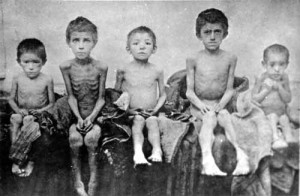The theory of natural selection and the concept of survival of the fittest could be tailed to what genocide is about. Apart from ethnic cleansing, genocide is defined as the intentional killing of a significant proportion of the population from a certain nationality or ethnic group with the intent of destroying that nation or ethnic group. It is becoming more widely recognized as an important event in modern global history. In this article, we present a list of ten terrible genocides in the history of mankind.
Here are the ten shocking genocides in human history.
- The Holocaust, Europe (1941-1945)

- The Holodomor, Ukraine (1932-1933)

- Polish Genocide, Poland (1939–1945)

- Cambodian Genocide (1975-1979)

- Circassian Massacre, Southwest Russia (1830-1870)

- Armenian Massacre, Turkey (1915-1916)

- Rwanda-Burundi Genocide, Africa (1994)

- Greek Genocide, Ottoman Empire, Europe (1913–1922)
 The Greek Genocide, and included the Pontic genocide, was the systematic murdering of the Christian Ottoman Greek population of Anatolia on the grounds of their religion and ethnicity during World War I and its aftermath (1914–1922). It was carried out by the Ottoman Empire’s government, led by the Three Pashas, and the Grand National Assembly’s administration, led by Mustafa Kemal Atatürk, against the Empire’s indigenous Greek population. Massacre forced deportations through the Syrian Desert, expulsions, mass executions, and the demolition of Eastern Orthodox cultural, historical, and religious sites were all part of the genocide. Hundreds of thousands of Ottoman Greeks were killed at this time. The majority of the refugees and survivors made their way to Greece (totaling over a quarter to the prior general population of Greece). Some, particularly in the eastern provinces, sought sanctuary in the Russian Empire.
The Greek Genocide, and included the Pontic genocide, was the systematic murdering of the Christian Ottoman Greek population of Anatolia on the grounds of their religion and ethnicity during World War I and its aftermath (1914–1922). It was carried out by the Ottoman Empire’s government, led by the Three Pashas, and the Grand National Assembly’s administration, led by Mustafa Kemal Atatürk, against the Empire’s indigenous Greek population. Massacre forced deportations through the Syrian Desert, expulsions, mass executions, and the demolition of Eastern Orthodox cultural, historical, and religious sites were all part of the genocide. Hundreds of thousands of Ottoman Greeks were killed at this time. The majority of the refugees and survivors made their way to Greece (totaling over a quarter to the prior general population of Greece). Some, particularly in the eastern provinces, sought sanctuary in the Russian Empire.
- Dzungar Genocide (1755)

- Bangladesh Genocide (1971)

The findings reveal that genocide participation has a long-term and enduring impact on perpetrators’ and victims’ mental health, with many showing evidence of trauma. The psychological and demographic repercussions of genocide on youth have an impact on the transition to adulthood. These consequences will be felt by future generations of youth. The transfer of children during genocides has a demographic effect.



